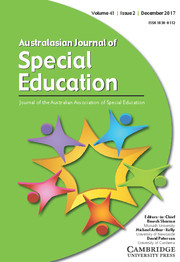No CrossRef data available.
Article contents
Distinctive Aspects of Diagnosis and Prescription in Mathematics for Children with Special Needs
Published online by Cambridge University Press: 26 February 2016
Extract
Over the past decade there has been in evidence a steadily growing awareness of the many children in our schools experiencing difficulties in school mathematics achievement. Recent public emphasis on educational accountability’ and the associated ‘back to basics’ debate has certainly contributed to the growing concern with those failing to learn elementary mathematics.
In considering the manner in which our educational institutions are responding to the needs of such children, it needs to be stated at the outset, that the situation is confused by a lack of agreement as to what skills are ‘basic’ in the first place. If those children deemed to be in need of ‘remediation’ in mathematics, are to be well served, much more attention will need to be given to an analysis of what is ‘basic’ for them. At present, the view still prevails which restricts basic mathematics content to arithmetic, and in particular, it emphasises mechanistic skills in paper and pencil computation. It seems unlikely that any future employers will only require their workers to carry out mechanistic computational skills, yet pleas are still heard that this ought to constitute the main mathematical diet of those in remedial mathematics classes. It is often assumed that until these skills have been mastered no other worthwhile mathematics can be attempted. The current president of the National Council of Teachers of Mathematics (N.C.T.M.), Shirley Hill (Newsletter, 1979) refers to this assumption as the ‘prerequisite fallacy’. This belief is manifested in schools where remedial children are kept in groups until a minimal level of competency is reached in the usual mechanistic skills. This means that many children never have an introduction to challenging and interesting mathematical problem solving at their own level. Insufficient recognition is given to the fact that much of this kind of valuable work can be given to children without prior complete skill mastery. Current practices too often, only disadvantage the slow learner even more, as the mechanical performance skills are the ones which will be least required of employees and citizens in the future.
- Type
- Research Article
- Information
- Copyright
- Copyright © The Australian Association of Special Education 1980


